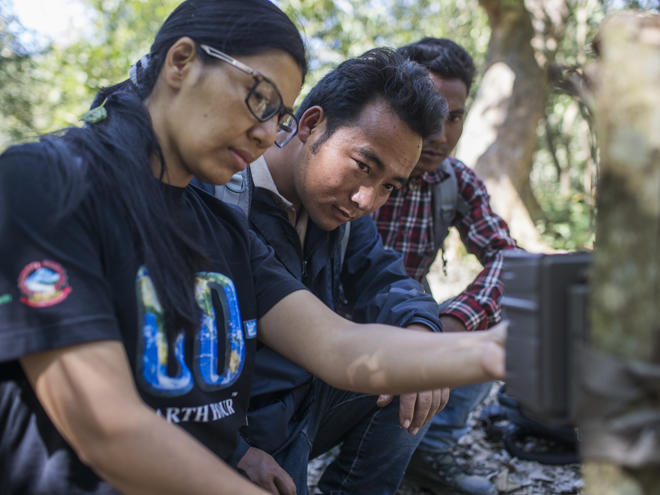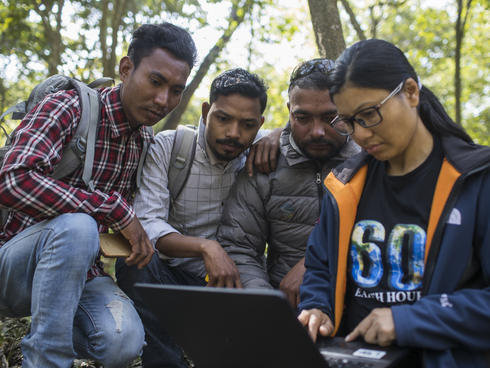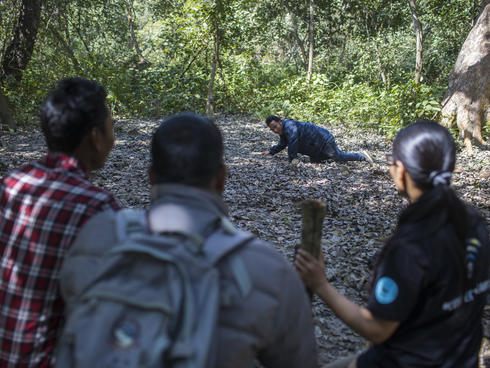
When Chain Kumar Chaudhary’s college friends hear about his work, they are often surprised. Having previously confessed he “never cared about the forests,” the 25-year-old humanities graduate now works as a citizen scientist with WWF Nepal.
Growing up, Chaudhary says: “I didn’t know very much about the forests or the animals that lived in them, so I didn’t have any feelings towards them.” That was partly because Khata Corridor, the region close to Bardia National Park in southwestern Nepal where he was raised, used to be “completely barren” with not much “to see or conserve.”
But things slowly began to change when Chaudhary was a teenager. As part of WWF Nepal’s reforestation efforts in the Terai Arc Landscape–Nepal’s first conservation region, of which Khata Corridor is a part, –Chaudhary’s parents and neighbors began planting seedlings to rehabilitate the forest close to their village. Soon, the local Community Forest Coordination Committee, or CFCC, was looking for people to join them in their conservation work. Chaudhary, who had just completed his studies and had time on his hands, decided to apply.
The rest, as they say, is history. “Once I started getting engaged with the CFCC and learned more, I started feeling this connection to the animals and the forest,” says the soft-spoken Chaudhary. Along with nine others, he was selected to join the local Community-based Antipoaching Poaching Unit, who help keep an eye out for illegal activities in nearby forests.
Then two years ago, Chaudhary was chosen as one of a handful of citizen scientists who work with biologists from WWF Nepal to help protect the tigers, rhinos, elephants, and other wildlife that are commonly found in and around Bardia National Park.


“We are responsible for setting up and maintaining camera traps to monitor wildlife movement in the area,” explains Chaudhary. Each citizen scientist is assigned two to three sites in their local areas where animals are known to frequent. They visit these sites every other day to examine the status of the camera traps, change their batteries, swap out memory cards, check for animal movements, and download any pictures captured to send to the biologists. If a camera trap is to be placed in a new site, the citizen scientist will also conduct a thorough assessment of the surrounding vegetation, walking roughly 0.3 miles in all directions to record the types of plants and trees found in the area, their relative densities and stages of growth, and other details.
It’s hard work, says Chaudhary. “It’s difficult to reach all the spots in one day even with my bicycle. Sometimes I have to walk and it can take about four to five hours.” Things get worse in the monsoon season, when rain-soaked trails become slippery with mud.
But the rewards make it all worth it, he says. “My favorite part of the job is when I get to see the image of a tiger on a camera trap, especially in locations where we worked so hard to put them [the traps] up.”
Tigers are the focus of the citizen scientists’ work here in Khata Corridor, where the big cats are free to roam between Bardia National Park and India’s Katerniaghat Wildlife Sanctuary in the south. Over the past two years, the teams have managed to identify — through the network of camera traps they’ve set up throughout Khata’s community forests — more than 30 individual tigers.
“I feel very happy there is so much animal movement in the jungles that my parents helped plant and grow. It motivates me even more to help protect them,” says Chaudhary. “I get very excited when I camera trap a tiger, and when I show the pictures to my son, he gets very excited too.”
Chaudhary is also hopeful that in the future, more will be done to help conserve the animals and the habitats they live in. “Now that there is a concept of the community forest, more people really understand the need to protect and conserve the forest.”
Enviroshop is maintained by dedicated NetSys Interactive Inc. owners & employees who generously contribute their time to maintenance & editing, web design, custom programming, & website hosting for Enviroshop.
